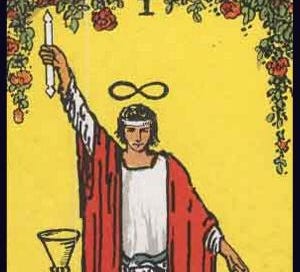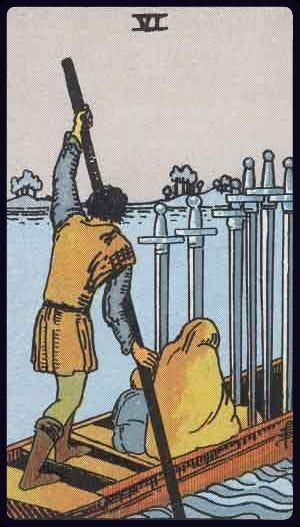Aquarius Decan 2
What follows is an excerpt from a book I am in the process of writing about the connection between Tarot and Zodiac. It deals with the Six of Swords which is associated with the second decan 10° - 20°Aquarius. This is the part of the Zodiac that The Sun is passing through today (February 3,2025). Mercury rules this section of The Zodiac “by face” meaning that, even though he neither rules nor is exalted in Aquarius, he nevertheless possesses a special potency here. In Tarot, Mercury (Hermes) is represented by The Magician Card thus you will see many references to this card in the passage that follows.
If you watched my recent video, many of the ideas I spoke of there are taken up here in greater detail. I hope you find it interesting. Thank you for reeadinbg.
In The Six of Swords, we see two huddled figures, perhaps a mother and her child. They depart from troubled waters for the promise of calmer seas and the virgin land beyond. The boatman who guides them imitates the posture of the Magician, one hand toward the deep, the other toward the heavens above. By his oar he connects the heavens to the depths and drives the fragile bark to safety.
Along with the passengers we see six swords. Once more, we are reminded of the inherent Aquarian contradiction. These people are fleeing from a social order that, in its effort to make a rule for all, invariably excludes someone. In order for the outsider, the dispossessed, the refugee, the vanquished political opposition to survive they must live by their wit (The Sword). Often this requires the possession and skillful use of literal weapons, but it always means remaining one step ahead of the victor (one more sword).
Liberatory movements often resort to violence and coercion “in the name of the revolution”. In addition, it often happens that those who escape oppression and marginalization in their own land reproduce these conditions in the new. One might steal swords from the king of the old land only to use them to steal land from the natives in the new (Hermes is a thief after all). This process is invariably fully rationalized in the name of progress or bringing about the kingdom of God on Earth or some other high-minded notion that suggests that the rules imposed upon others are, after all, for their own good (Hermes isn’t above such talk either).
We would err in the belief that there is some final solution to this problem. Such solutions inevitably take the form of yet another system that will breed another class of outsiders. Instead, we should understand this process as an underlaying current of human social organization with its own dynamics and polarities (Hermes the Magus) to orient ourselves within the social order in which we find ourselves and, if need be, find some safe harbor beyond for ourselves and our kin. But we must always understand that we might be bringing with us, like some stowaway invasive species, the seeds of the verry thing we sought to escape.




